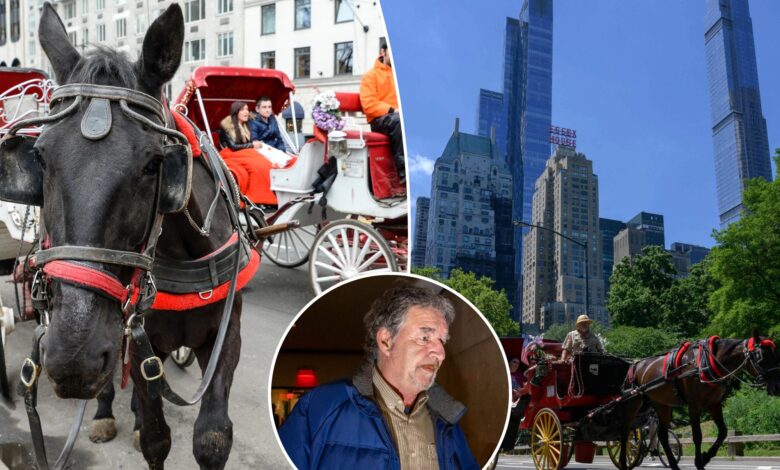Advocates call for Central Park carriage horse ban ahead of driver’s animal abuse trial

Neigh-sayers galloped outside Manhattan Criminal Court Monday afternoon to call for a shutdown of the city’s carriage horse industry as a handler of a horse that died two years ago faced his first day of trial — or so they thought.
Ian McKeever, who is facing animal abuse charges in connection to the death of his carriage horse Ryder in 2022, was not able to appear in court Monday due to a scheduling conflict with his attorney, The Post learned.
Despite the adjournment, roughly 30 demonstrators remained in the scorching heat for the “Criminal Horse Abuse Trial for Ian McKeever” protest co-organized by non-profit NYClass (which has fought to ban or restrict carriage horses), PETA and Marine veteran-led Unbridled Heroes Project.
“We commend the Manhattan DA for prosecuting Ian McKeever for his barbaric abuse of Ryder, and we hope that Mr. McKeever ends up behind bars where he belongs,” Edita Birnkrant, executive director of NYClass, said in a statement.
“However, one conviction is not enough to end the suffering of so many other horses in New York continually forced into heavy Midtown traffic daily while elderly, injured and sick — just like Ryder was.”
The 2022 tragedy, in which Ryder collapsed on a busy Manhattan street and later died, spurred Ryder’s Law, legislation that was introduced in June by Council Member Robert Holden. The bill aims to phase out the practice and ensure the horses are relocated to greener pastures.
More than 70% of New Yorkers support a bill banning carriage horses, according to a 2022 poll conducted by the Animal Legal Defense Fund.
McKeever is due back in court on Sept. 13 for the trial opening.
Birnkrant told The Post she saw McKeever smirking and laughing outside the court after the carriage driver learned his trial date would be pushed back.
“We were walking out and going down the stairs and he turned around and he turned around and he grinned at me, stopped on the stairs, and started laughing,” Birnkrant said. “And he’s done this before. He laughs. He smirks. He thinks it’s all a big joke.”
McKeever’s attorney Robert Loving described the carriage operator as a respected figure within the industry. He denied the charges — which included overdriving, torturing and injuring animals and failing to provide proper sustenance — and insisted that his client didn’t kill Ryder, but rather cancer finished the ailing horse off.
“This guy had worked for carriage horse driver 35 years never had any problems,” Loving told The Post.
“Two months after this incident, the horse dies of cancer. We will argue at trial the horse had cancer when he collapsed and that was substantial contributor to his collapse,” McKeever’s lawyer said.
Monday’s rally called not only for McKeever’s conviction, but the elimination of an industry “where unchecked neglect, abuse and deaths of horses runs rampant,” NYClass said in a statement.
Birnkrant told The Post the rally was also designed to call out City Council, who she says has “turned a blind eye” to rampant animal abuses perpetuated by New York’s horse carriage drivers.
“We really were urging for his conviction and hopefully the strongest punishment possible. Not just a slap on the wrist — he worked this horse to death,” Birnkrant told The Post. “They need to make an example out of this person who was a leader in the industry and so egregiously committed this act of animal torture and laughs about it now.”
Earlier this month, The Unbridled Heroes Project conducted a wellness check on carriage horses at a stable on the west side – finding tied up horses, stalls too small for them to lie down and animals so malnourished their ribs were visible through their skin.
The extreme heat this month has prompted the Department of Health to issue work suspensions for the horses when temperatures reach over 90 degrees, though Birnkrant previously told The Post she has received “dozens” of reports of carriage horses working in the heat since July 5 — the first day in a string of heat-related work suspensions.
Birnkrant also complained that the Department of Health and the New York City Police Department are not doing enough to enforce the work stoppage, claiming there is no mechanism in place to ensure that the laws are properly and thoroughly enforced. This lax approach, she said, allows crooked carriage drivers to operate with impunity, with little risk of getting caught or even punished.
To her, the city is “asleep at the wheel.”
“Nothing changes because these agencies are overwhelmed with human issues,” Birnkrant told The Post. “The Department of Health doesn’t have the capacity to oversee the welfare of a 100-plus workers — it’s not going to happen … The city is basically enabling the animal abuse.”
A spokesperson for the DOH told The Post last week it has received one heat-related complaint since July 5, marking an increase from the zero reported heat-related complaints last summer. A follow-up from the NYPD found no violations, the DOH said.
Advocates say Ryder’s Law would not only free horses, but their carriage drivers as well. Due to the current sweltering heat, drivers told The Post they can’t work for days at a time due to work suspensions – and it’s affecting their bottom line.
Holden’s legislation would establish a workforce development program to help carriage drivers find other jobs.
“In 21st Century New York City, and frankly anywhere else, we should no longer see horses laboring to pull carriages in city traffic; it’s a practice that’s outdated, inhumane and unsafe,” Holden said in a statement.
“Passing a ban on horse-drawn carriages is a no-brainer decision that would protect horses and the public and benefit workers, marking an end to this cruel and antiquated industry.”




